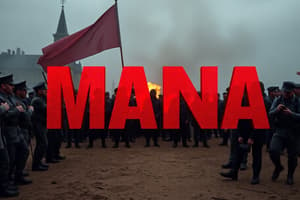Podcast
Questions and Answers
The assassination of Archduke Franz Ferdinand was a minor event with little impact on the onset of war.
The assassination of Archduke Franz Ferdinand was a minor event with little impact on the onset of war.
False (B)
Militarism, characterized by an arms race, contributed to the climate of fear and suspicion in Europe.
Militarism, characterized by an arms race, contributed to the climate of fear and suspicion in Europe.
True (A)
The Central Powers included Germany, Austria-Hungary, Ottoman Empire, and Greece.
The Central Powers included Germany, Austria-Hungary, Ottoman Empire, and Greece.
False (B)
Trench warfare was primarily a feature of the Eastern Front during the war.
Trench warfare was primarily a feature of the Eastern Front during the war.
Total war indicates that only military personnel were involved in the war effort.
Total war indicates that only military personnel were involved in the war effort.
The Treaty of Versailles imposed strict penalties on Germany, affecting its future stability.
The Treaty of Versailles imposed strict penalties on Germany, affecting its future stability.
Political changes resulting from the war included the rise of new nations and the collapse of several empires.
Political changes resulting from the war included the rise of new nations and the collapse of several empires.
The use of propaganda during the war was solely focused on promoting peace and reconciliation.
The use of propaganda during the war was solely focused on promoting peace and reconciliation.
Flashcards
Nationalism
Nationalism
Extreme love for one's country and a strong belief in its independence.
Imperialism
Imperialism
The practice of one country extending its power and influence over another, often through colonization and exploitation.
Militarism
Militarism
The build-up of military strength and the readiness to use it aggressively.
Alliances
Alliances
Signup and view all the flashcards
Trench Warfare
Trench Warfare
Signup and view all the flashcards
New Technologies
New Technologies
Signup and view all the flashcards
Total War
Total War
Signup and view all the flashcards
Propaganda
Propaganda
Signup and view all the flashcards
Study Notes
Background and Causes
- Nationalism: Intense patriotism and a desire for self-determination fueled rivalries between European powers, increasing tensions.
- Imperialism: Competition for colonies and resources in Africa, Asia, and the Pacific heightened tensions between European nations.
- Militarism: An arms race and the development of powerful armies and navies created a climate of fear and suspicion.
- Alliances: A complex system of treaties obligated nations to defend one another, creating a domino effect if conflict erupted. The alliance system dragged more nations into the conflict than initially anticipated.
- Assassination of Archduke Franz Ferdinand: The assassination of the Austro-Hungarian heir triggered a series of events that led to the outbreak of war.
Key Players and Fronts
- Central Powers: Germany, Austria-Hungary, Ottoman Empire, Bulgaria.
- Allied Powers: France, Great Britain, Russia (later replaced by the Soviet Union), Italy, United States (later).
- Western Front: Characterized by trench warfare, stalemate, and heavy casualties.
- Eastern Front: A more mobile front, involving large-scale battles and troop movements.
- Other Fronts: Conflict also occurred in the Middle East, Africa, and the Balkans.
Characteristics of the War
- Trench Warfare: The hallmark of the Western Front, characterized by elaborate trench systems, no-man's-land, and devastating artillery bombardments. This resulted in horrific casualties and a stalemate.
- New Technologies: The war introduced new technologies such as machine guns, tanks, airplanes, poison gas, and submarines, drastically altering the nature of warfare.
- Total War: The war involved the entire population and economy of the nations involved, mobilizing resources, production, and manpower for the war effort.
- Propaganda: Governments employed propaganda to maintain public support for the war and to demonize the enemy.
Impact of the War
- Casualties: The war resulted in millions of deaths and injuries.
- Political Changes: The war led to the collapse of empires (Austro-Hungarian, Ottoman, Russian), the rise of new nations, and shifts in the global balance of power.
- Economic Consequences: The war inflicted immense economic damage on European nations, leading to inflation, economic instability, and social unrest.
- Treaty of Versailles: This treaty imposed harsh penalties on Germany, contributing to future conflicts.
Aftermath and Legacy
- Treaty of Versailles: The treaty aimed to prevent future wars but ultimately failed. Its harsh terms towards Germany contributed to resentment and instability.
- League of Nations: An international organization formed to promote peace and prevent future wars, but ultimately proved ineffective.
- Rise of Totalitarianism: The war's aftermath fostered conditions that allowed for the rise of totalitarian regimes in the 1930s and 1940s.
- Lasting Impact on Society: The war profoundly affected European culture, literature, and art, leaving a lasting imprint on the collective consciousness. The atrocities and disillusionment inspired various expressions of grief and artistic reflection.
Studying That Suits You
Use AI to generate personalized quizzes and flashcards to suit your learning preferences.




